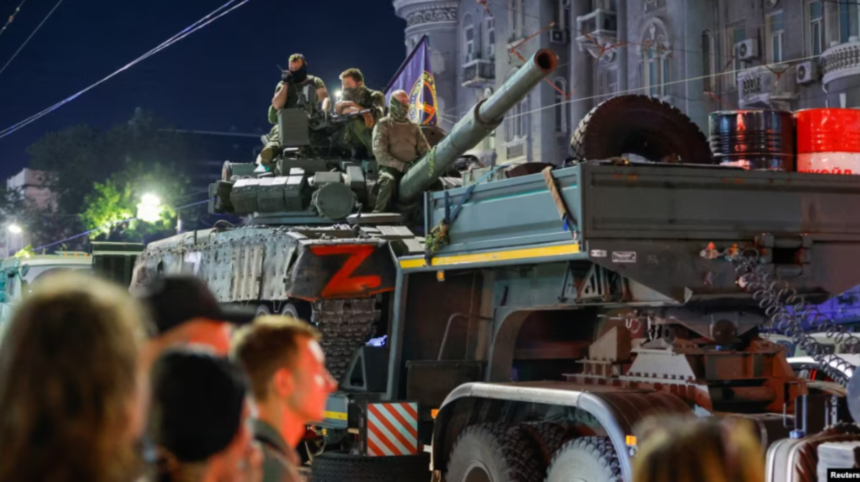The Public Prosecutor’s Office in North Macedonia is investigating two Macedonian nationals who are reported to have fought in Ukraine for Russian paramilitary groups, one of whom was a member of the private Wagner army.
Prosecutors are pursuing criminal charges against Macedonian nationals suspected of participating in the war in Ukraine.
Participation in foreign conflicts constitutes a criminal offense in North Macedonia.
“As for the punishment prescribed for the criminal offense ‘participation in a foreign army’, it can be up to four years,” the Public Prosecutor’s Office said in a response to Radio Free Europe.
So far, neither the Prosecutor’s Office nor the police have provided details about how many people from the country have gone to fight in Ukraine, nor if there are recruiters organizing the recruitment of fighters from North Macedonia.
The Ministry of Internal Affairs (MIA) has released notices in less than a month about two individuals who participated on the Russian side in the war in Ukraine, and it was also mentioned that a Macedonian citizen had died in the fighting.
The most recent notice, from December 23, states that the police are prosecuting Macedonian nationals for participating in the Russian army in the Ukrainian military conflict.
The case involves a 37-year-old man from Skopje (Lj.B.), who, along with the deceased (T.Sh.), had applied to serve in the Russian army through the “Telegram” app.
According to the MIA, the two suspects traveled to Russia in September of this year, where they signed agreements with the Ministry of Internal Affairs of the self-declared Donetsk People’s Republic (which Russia considers part of its territory but is not recognized by any other country) and joined their military and paramilitary formations.
MIA: Recruiters via the Internet
Following a search at the home of one of the suspects (Lj.B.), the police found documents, tactical clothing, and other items that, according to the MIA, confirm his involvement in the conflict. Both suspects have been placed under house arrest.
In the first case, published on November 30, it was reported that a 28-year-old man (J.K.) traveled to Moscow in October to join the Russian army for a reward of 3,000 euros. Upon his return, Macedonian authorities arrested him and charged him.
According to investigations, (J.K.) had contacted a recruiter via the internet and, after arriving in Russia, was asked to surrender his passport, after which he had to sign an agreement and undergo training to fight in Ukraine.
The authorities have not yet responded as to whether these are isolated cases or part of an organized recruitment effort of fighters from the country to participate in the war in Ukraine.
The MIA briefly responded to Radio Free Europe, stating that, together with the Prosecutor’s Office and other security and intelligence services, they are taking steps to verify information on all individuals suspected of being involved in paramilitary forces.
The cases were not commented on by Pavle Trajanov, the National Coordinator for Preventing Violent Extremism and the Fight Against Terrorism, who said that currently, he does not have direct information from the MIA regarding the number of individuals from the country participating in the war in Ukraine.
In previous years, there have been cases of participation in foreign armies, including in the war in Syria, with the National Committee for Combating Violent Extremism and Terrorism reporting that over 140 citizens of North Macedonia (excluding children) traveled or attempted to travel to Syria or Iraq to join terrorist groups.
Background of the Russia-Ukraine Conflict
The conflict between Russia and Ukraine began more than a decade ago, starting with the annexation of Crimea by Russia in 2014, and escalated into a full Russian invasion when tens of thousands of Russian soldiers crossed the Ukrainian border in February 2022.
To date, there has been no public information from North Macedonia’s security services regarding its citizens’ participation in this war. More cases have been registered in countries such as Serbia, Bosnia and Herzegovina, and Montenegro.
Some returnees from these countries have testified that they fought for various units, including groups like Volk, the Sudoplatov battalion, and the Russian private military group Wagner, which has emerged from the shadows after Russian state media began daily praise for its mercenaries’ successes in the Ukraine invasion.
Wagner and the Balkans
Wagner is a private mercenary army, founded in 2014 by Russian national Yevgeny Prigozhin, who was close to the Kremlin and died in a plane crash in August 2023, exactly two months after his unit organized a rebellion against Moscow’s authorities. Prigozhin was previously known as “Putin’s chef” because of the numerous contracts his company had with the state.
Media in Serbia have written about Wagner’s connections to far-right groups in the country that support the Kremlin’s policies. Murals in support of this group have also appeared in Belgrade.
After the start of Russia’s war in Ukraine in February 2022, Russian media outlet Russia Today Balkan published an announcement from Wagner seeking potential volunteers. However, at the time, there was no confirmed information about Wagner recruiting new fighters from Serbia.
Serbian authorities said they were investigating the cases, while concerns over Wagner’s recruitment efforts in Serbia and other countries were also expressed by the U.S. State Department.
There have been links in the past. In March 2017, a Serbian national was sentenced to one year in prison for participating in the conflict in Ukraine on the side of the Wagner group. This was one of 32 decisions Serbia made against fighters who fought in the occupied territories of Ukraine.
The Wagner unit faces potential war crimes charges in Ukraine, Syria, and other African countries, and has been under European Union (EU) sanctions since December 2021 for human rights violations in armed conflicts worldwide. It has also been on the U.S. blacklist since June 2017 for its involvement in conflicts in eastern Ukraine.
Volk and the Redut Network
In Serbia, there have been cases where Serbs fought for other Russian groups, as happened in June 2023 when some returned from the war in Ukraine after fighting for the Russian Volk unit. Prior to this, they had undergone short training sessions in training areas near Moscow.
As reported by Radio Free Europe’s Balkan service, the case of this group is evidence of the existence of a secret underground network that provides international cover for engagements from the Balkans on the front lines, as well as participation in Russia’s war against Ukraine.
Radio Free Europe had previously managed to interview one of the fighters from Serbia, who had enlisted as a mercenary, granted anonymity. His testimony provided a detailed account of his eight-month experience during 2022-2023.
Dragani – a well-known identity to RFE – spent two months in training and another six months under contract to participate in the war in Ukraine, and he provided RFE journalists with documents and photographs that confirmed his story.
He trained with other Serbian recruits for two months at the Alabino military training ground west of Moscow, where he was commanded by someone named Dima and another supposed officer from the GRU, named Oleg.
Dragani said he received 110,000 rubles (around $1,215) for each of the two months of training, and about double that amount for each of the six months of fighting in Ukraine.
Dragani estimated that during his time in Alabino, there were around 25 Serbs, and he assumed they were from Serbia, but also from Republika Srpska in Bosnia and Herzegovina, Montenegro, North Macedonia, and even one Serbian national from France. Radio Free Europe could not independently confirm this information.
Dragani said that he had signed a six-month contract with a private military company under Dima and Oleg’s tent, although he did not offer copies of the contract or photographs to Radio Free Europe.
“In the contract, it could be seen that it had no connection to Russia’s Ministry of Defense, but was with the private military company 000 Redut,” he told Radio Free Europe.
Radio Free Europe’s investigative departments, Systema and Schemes, previously confirmed that at that time, Russia was using a company called PMC Redut to recruit and send fighters to Ukraine.
Heading to War After Brief Training
As revealed by Radio Free Europe, in October 2023, the Volk unit was one of 20 formations fighting in Ukraine under the Redut name.
Dragani claimed there were no issues with the two-month combat training process, which, according to him, took place from 9 a.m. to 5 p.m., six days a week. After two months in Alabino, he was involved in fighting in Ukraine in January 2023.
He fought in battles near Lysychansk in the Luhansk region and near Avdiivka in the Donetsk region.
Dragani also mentioned that during his eight-month experience, he counted around 70 other Serbs, adding that many of them were sent into battle with very little training and completely unprepared for combat.
After six months in Ukraine, in June 2023, he said he was disillusioned with what he had witnessed in the Russian army.
“From my perspective, ‘business and corruption thrive,’ and ‘the Russians, as we Serbs imagine and consider them, exist in a very small percentage,'” he said.
Before returning to Serbia, Dragani received a fake certificate stating that he had worked in construction. He was given a document claiming he had worked for a construction company in Moscow to protect himself in case Serbian border authorities suspected him.
Sudoplatov Battalion and Sova Unit
Fighters from Serbia have also joined Russian forces in Ukraine through the Sudoplatov battalion.
Radio Free Europe (RFE) uncovered details about two fighters, codenamed “Sava” and “Dunav,” who claimed to have been part of this group and had joined Russian forces in Ukraine.
The Sudoplatov battalion







